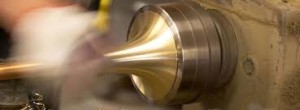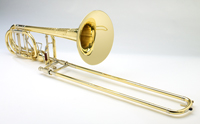 Any serious discussion of the great trombone makers includes Steven Shires. His horns have been highly prized since his work as a key figure in the early success of Edwards through to the current models of The S. E. Shires Company. (Recently, a young bass trombonist became excited at the prospect that his early Yamaha bass trombone bell may have been spun by Shires at Schilke.) Beyond his excellent horns is Shire’s reputation for treating people right. Invariably, visitors to his shop are treated well and warmed by the experience of seeing a highly professional operation committed to excellence. Mr. Shires has generously given of his time and expertise to respond to our queries, and we are delighted to offer a glimpse inside the mind and factory of Steve Shires as our fourth installment of “The Craftsmen’s Bench”tm.
Any serious discussion of the great trombone makers includes Steven Shires. His horns have been highly prized since his work as a key figure in the early success of Edwards through to the current models of The S. E. Shires Company. (Recently, a young bass trombonist became excited at the prospect that his early Yamaha bass trombone bell may have been spun by Shires at Schilke.) Beyond his excellent horns is Shire’s reputation for treating people right. Invariably, visitors to his shop are treated well and warmed by the experience of seeing a highly professional operation committed to excellence. Mr. Shires has generously given of his time and expertise to respond to our queries, and we are delighted to offer a glimpse inside the mind and factory of Steve Shires as our fourth installment of “The Craftsmen’s Bench”tm.
How did you get your start in music?
Like many students at the time, I started in music in fifth-grade elementary band. It was always something I enjoyed and that I was pretty good at. I think it was when I began not just to play the trombone, but also to listen to brass quintet music and J. J. Johnson, and Frank Rosolino (and so many others), that I really fell in love with the sound of the trombone.
When did you first repair an instrument? What was it like?
While I was attending the University of Iowa as a music major, I worked at the local music store, West Music. I began by simply cleaning their rental instruments. I was soon trained to take out dents and repair broken solder joints. I was always curious about what made one instrument sound and play so differently from another, so I began to experiment. Soon I was finding very old small bore trombones, and converting them into alto trombones.
At what point did it become evident that you wanted to become an instrument maker? Why trombone?
When I finished my undergraduate degree at Iowa, I moved to Chicago to study with the members of the Symphony there; primarily Arnold Jacobs. While practicing and taking lessons, I worked at Schilke Music as a bell spinner. From that time forward, I continued to study trombone, practice, and take auditions. Eventually, it was clear that I was more apt to make a living building and repairing instruments than playing trombone. However, I still enjoy playing the trombone when I get a chance.
What were your early experiences like?
After working at Schilke’s, I met my wife and we moved to the Boston area. There, I worked at Osmun Brass Instruments, where I learned a great deal about rebuilding valves and custom repair work. I had a chance to work with a lot of professional brass players, tweaking their instruments to make them sound and respond to each player’s taste. In 1993, I was hired by Edwards to work on sales and design of Edwards instruments.
What convinced you to strike out on your own and establish Shires?
I enjoyed my work at Edwards a great deal. It gave me a chance to work with some of the best trombonists in the world. But I was finding there were some things I wanted to do differently with the trombone that would not fit into the culture at Edwards. I really wanted to make it all my way, and really the only way to do that is to have your own company.
Why Boston?
In 1994, my wife and I decided to move back to Boston. She began to work for her former employer in the Boston area, and in 1995 I started the S.E. Shires company in the basement of my home.
Austere shop or show room? Why?
From the beginning, we put an emphasis on making everything in house, including machining our own parts and valves. We invested a great deal into machinery. We invested less money into our show room. We found that people visiting us wanted to see the instruments being made. I think brass players are more worried about how the horn plays and sounds than they are about having a show room that resembles a Lexus dealership. However, we are working on cleaning and organizing our shop as we always strive to improve quality and efficiency. We are planning on remodeling our showroom this year to improve appearance and acoustics.
our own parts and valves. We invested a great deal into machinery. We invested less money into our show room. We found that people visiting us wanted to see the instruments being made. I think brass players are more worried about how the horn plays and sounds than they are about having a show room that resembles a Lexus dealership. However, we are working on cleaning and organizing our shop as we always strive to improve quality and efficiency. We are planning on remodeling our showroom this year to improve appearance and acoustics.
Why add trumpets?
I have always loved the trumpet and great trumpet players. I was influenced a great deal by Adolph Herseth, Maurice Andre, Doc Severinsen, Maynard Ferguson, Miles Davis, Chet Baker, etc. I was asked by friends and dealers to make trumpets that had the same qualities we try to make in our trombones: to play easily, evenly, and in tune, but, foremost, to have a great “traditional” sound.
What types of music do you enjoy listening to?
I listen to many genres. I love big band jazz and small ensemble jazz. I often listen to classical music as well—Mahler, Brahms, Mozart and Wagner being among my favorite composers.
Which instruments do you enjoy listening to?
I listen mostly to the trombone, the trumpet, the cello, and the human voice.
What is special about the sound of the trombone?
The trombone is the first instrument I played, so it was what I came to love. I think the hand slide gives the trombone unique ways to express music through the use of slurs, articulation, and vibrato that I really enjoy.
Valves are integral. How did you arrive at your valve offerings and why?
The most important thing about a good valve is to make sure the sound when using the valve matches the sound of the open horn. We find the three types of valves we use each have their advantages. We simply want to give players more options.
The Axial flow valve has the largest sound. It is the most open in the low register, and connects with the pedal register the best.
A good rotary valve is centered and articulate, but less open.
Our Tru-Bore valve is in between the others. I think it’s a good compromise.
Which aspects of historic horns do you admire?
Classical:
Bach
I like the clarity and breadth of a Bach
Holton
I have found Holton horns to be very even and solid sounding.
Conn
I grew up playing an old Conn 8H. I love the warm, centered sound of the Conn. It also feels the most free to me.
Jazz:
King
Kings always sound very centered and articulate.
Williams
I find Williams are comfortable for me as a player who plays primarily large bore trombones. They feel more open and warm.
Olds
Olds are very solid instruments that are open and even.
What characteristics have others said your horns posses?
Classical:
People feel our large bore horns are even, and very resonant.
Jazz:
The small bore horns are open and even.
Which is the most important characteristic to you?
I want our horns to have a great, flexible sound. But I also want the instruments to feel very even across the partials.
What has been your biggest breakthrough or innovation?
I think the action of our slides and quality of our valves are two of our biggest innovations. But maybe our biggest innovation is the ability to make bells in different ways to get the response and sound characteristics we want. We’ve looked at old Bachs, and make one piece bells in that fashion. We studied old Conns as well, and we make two piece bells like Conn did in the 50’s.
Which slide lubricant(s) do you recommend, and why?
We like Hetman oils and Slide O Mix. They are both quality products that simply work well on our instruments.
c. 2013 David William Brubeck All Rights Reserved davidbrubeck.com
